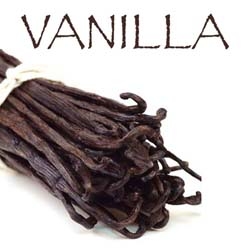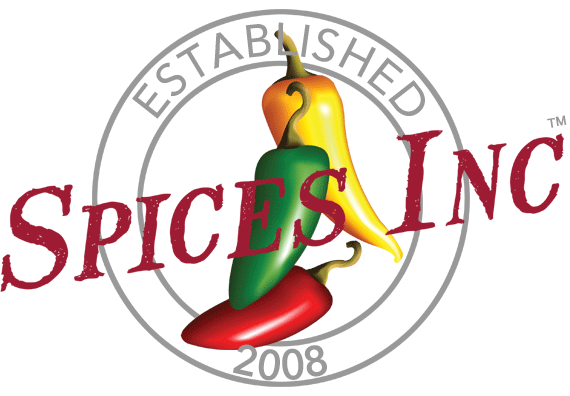
During the holiday season, we come in contact with a wide variety of recipes which call for vanilla in some form or fashion. These recipes may not specify which type of vanilla to use, and if you are new to using spices that are not sold with a generic "vanilla" label on them, this may be a little bit confusing. We're here to help you decided which type of vanilla is best for the dish or dessert you are making and to answer some other questions you might have.
What is Vanilla?
Most people could tell you that vanilla comes from a bean, but what kind of plant does that bean grow on? Vanilla beans are derived from the orchid plant of the genus Vanilla. The word vanilla comes from the Spanish word "vaina" which translates to little pod. This vanilla ‘fruit' was originally grown in Mesoamerica, part of which is where Mexico is located today. For many years, attempts were made to spread vanilla production to other countries. The first effort, in 1837, was by a Belgian botanist named Charles François Antoine Morren who found a way to artificially pollinate the vanilla orchids, but this venture turned out to be financially unworkable. In 1841 the second attempt to artificially pollinate vanilla orchids was done by a slave named Edmond Albius who lived on the French island of Réunion, formerly known as Bourbon, in the Indian Ocean. He did this when he discovered that vanilla orchids could be hand pollinated. This opened doors for vanilla production outside of Mexico that otherwise would not be possible. Today, four different types of vanilla are grown around the world, but they can all be traced back to the one original type of Mesoamerican vanilla ‘fruit'.
Types of Vanilla
Just like chile peppers and wine, different vanilla beans have different flavor profiles depending on where they are grown. This is not only caused by the differences in climate and soil, but also by each regions' unique method of curing and drying.
Madagascar
Madagascar vanilla beans, also known as Bourbon vanilla beans, have nothing to do with bourbon or any other type of alcohol (unless you are making vanilla extract). Instead, these vanilla beans from the genus planifolia, which originated in the Americas, are grown on the islands in the Indian Ocean. These islands include Madagascar, the Comoros, and Réunion, formerly the Île Bourbon (where Bourbon Vanilla gets its' name). Bourbon vanilla beans are the most popular type of vanilla, resulting from their clear and creamy flavor and the fact that Madagascar is the world's top producer of vanilla. These vanilla beans are the thinnest of the four types and also have the most flavor. Madagascar vanilla beans work extremely well with apples, eggs, fish, ice cream, melon, milk, peaches, pears and strawberries.
Mexican
Mexican vanilla beans, from the genus planifolia, have a reputation for being the best vanilla beans in the world – vanilla did originate in this area so you shouldn't be surprised. Mexico actually had a monopoly on vanilla beans until the 1800's explorers started exporting them to other countries. Mexican vanilla beans are thicker than other varieties. The flavor profile of Mexican Vanilla Beans is similar to Madagascar vanilla beans though the Mexican vanilla has a mellower, smooth, quality and a spicy, woody fragrance that provides a depth that the other vanilla beans can't match. The bold, robust flavor of Mexican Vanilla Beans is perfect in recipes where vanilla is playing a starring role which makes it perfect in rich baked goods, cheesecakes, chocolate desserts, custards, crème brulee, ice cream and sweet breads.
Tahitian
Tahitian vanilla beans are the most expensive type of vanilla bean, but don't let that deter you. These vanilla beans have a superb flavor and aroma. From the genus tahitiensis, these vanilla beans are wide and flat, while also containing less vanillin, an organic compound in vanilla beans that is responsible for the characteristic aroma and flavor, than the other three types. The aroma is floral with undertones of ripe fruit with a deep, rich flavor that includes cherry-chocolate, licorice and caramel. These characteristics make this type of vanilla the most used in commercial perfume products.
Ugandan
Sometimes Ugandan vanilla beans get overshadowed by these first three types of Vanilla, but Ugandan vanilla beans more than deserve to be included in any list of high quality vanilla beans. Vanilla beans that are produced in Uganda are much rarer than the first three types and have an incredible flavor profile and aroma. The aroma is earthy with hints of milk chocolate, while the flavor is bold because of the high levels of vanillin. These beans are similar in flavor to the creamy Madagascar beans, but are sweeter with a hint of milk chocolate which compliments dishes that also include chocolate. They are perfect for making incredibly rich desserts including ice cream, cookies and drinks.
Vanilla Extract
Not only are vanilla bean pods used to make desserts, but they are also used to make real vanilla extract. Many people do not know that the Vanilla flavoring that they buy at the grocery store may not have any real vanilla in it at all! True vanilla extract is made by soaking vanilla beans in alcohol until the alcohol absorbs the flavor and is completely worth the price. The most popular type of Vanilla used to make extract is Madagascar vanilla.
Now that you know a little bit about the different types of vanilla beans, you can continue to explore their complexities and the different forms that they come in – whole, extract and powder. You will also be more knowledgeable in picking the perfect vanilla for the job!
Related Posts
Holiday Spice Guide
Sweet and Bitter Flavors
Craft Brewers Favorite Beer Spices
Vanilla Extract - Is it Worth the Price?

